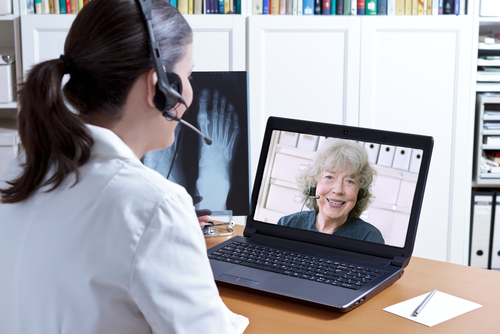Technology has been making our lives easier for decades now. One of its “products” is telemedicine, which is revolutionizing the healthcare industry. The benefits of telemedicine include bridging the gaps between the patients as well as health care providers. It enables patients to receive diagnosis and treatment in the comfort of their own home. Not just that, it also allows healthcare practitioners to reach out to a wider base of clients which in turns, results in greater revenues for them. Telemedicine is proving to be beneficial for not just healthcare providers but also patients, especially the elderly ones.
Five benefits of telemedicine for senior patients are:
Remote Monitoring
Seniors are prone to experience more chronic conditions such as heart disease and diabetes. These conditions require them to get checked up pretty frequently. With telemedicine, these patients can now be checked up without the hassle of physically being present at the doctor’s office. This practice is not just be convenient but also eliminates the added transportation costs and solve their mobility problems.
With that, various telemedicine applications also allow patients to check their vital signs themselves and send the reports to the Doctors which also mitigate the chances of emergencies.
Lower Chance Of Hospital Admission
As telemedicine bridges the gap between patients as well as healthcare providers, there are lower chances of senior patients being admitted. With that said, the doctors can now look closely at the patient’s situation, which would translate into detection of any potential medical problem beforehand. This has resulted in the patients being treated appropriately and hence, least likely to end up being admitted to the Hospital. With the increasing health care costs and understaffing issue, it’s a win-win situation for both parties.
Extended Specialist And Referring Physician Access
Since seniors are sensitive to chronic conditions, they require the attention and treatment of specialists. If such patients are located in remote areas, they have to travel long distances for such special care. This proves not just to be more expensive but also time consuming, which might worsen the patient’s health.
Telemedicine enables patients to have greater accessibility of such specialists no matter which part of the country they live in which is why it saves critically ill patients. This also helps the specialists reach out to patients in various geographical locations.
Avoiding The Hospital Germs
Many ill people go to the hospital to get cured. They may leave some germs behind. The conventional appointments require the patients to stay back at the hospitals, often for longer hours, either waiting for their turn or even getting treated. Since there are multiple other patients with medical conditions, the patients are prone to get the hospital germs. Elderly patients tend to have a weaker immune system which exposes them to such germs and illness more than anyone else. Telemedicine eliminates the risk of catching hospital germs and further complicating the situation for the senior patients.
Relieves Stress For Caregivers
Telemedicine has, undoubtedly, the benefit of increasing patient’s engagement in the whole process which results in greater satisfaction for them. With that, it also helps in relieving stress for the care givers at Retirement Homes in two ways.
Firstly, telemedicine has given them a platform to communicate and consult the nurses and health care providers whenever needed, which results in effective care being provided at the centers. Secondly, it helps them save time by not actually going to the doctor’s clinic and being stuck in traffic and in fact waiting long hours at the hospitals and clinics as often.
As beneficial as telemedicine can be for seniors, it also has various cons to it which must be taken into account before starting to use it. Telemedicine applications require proper knowledge and you should know how to be able to use and operate them. With that, it results in fewer physical consultation, which although reduces the issue of mobility for the elderly but raises concerns about proper diagnosis from the health care provider’s side. Not just that, telemedicine reduces care continuity. This is so because the software connects you with a different specialist each time who would be unaware of your past consultations and diagnosis.
Few tips for care givers who are responsible for senior patients at old homes, before adopting telemedicine are:
- Enquire About The Availability
Some health care centers and providers might already have existing home health monitoring or other telemedicine services available.
- Know Your Options
There are various companies who provide low cost Telehealth services. It is imperative you know what your options are before making the final decision.
- Trust
Make sure, the patient (senior) is in agreement with the whole idea of telemedicine. Trust is a vital component between the doctor, the patient and also, you as an intermediary for the best results.

